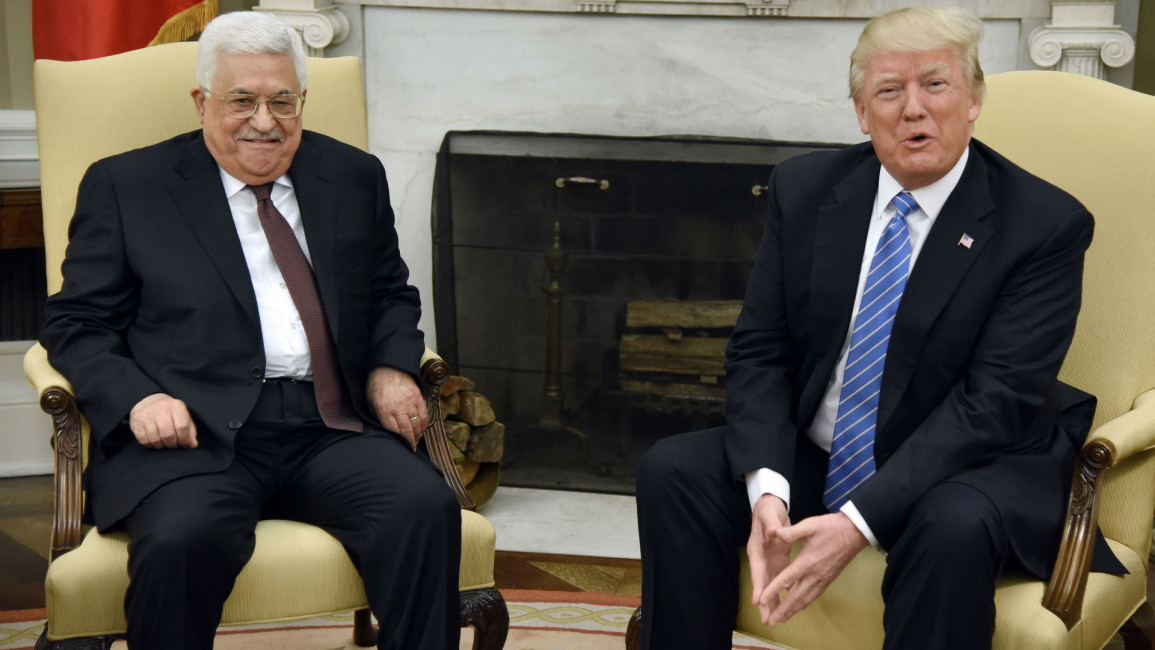
Abbas should be removed by the Palestinians, not by Washington
Last year's mass protests in both the Gaza Strip and the West Bank calling for his immediate resignation were largely ignored, and polls showing a majority of Palestinians were in favour of overthrowing Abbas passed unnoticed.
It wasn't until recently when Abbas echoed anti-Trump rhetoric, that suddenly Americans and Israelis seemed to want him out, too. Trump's planned embassy move, they thought, meant he was no longer relevant in the so-called peace process.
I could list countless reasons why Abbas shouldn't stay in power any longer. But all in all, his fate should be decided by a Palestinian vote, not by a decision from Washington that replaces one authoritarian with another.
In 2003, the "Roadmap" accords brought about the office of Palestinian prime minister. Its first incumbent, Mahmoud Abbas, landed in office with an American parachute; his appointment dividing Yasser Arafat's monopoly of power - seen at the time as a step towards inclusive democratisation.
In 2005, Abbas succeeded Arafat and advertised his presidency as "administrative employment" rather than a position of sultanic leadership.
Yet in no time at all, he had espoused an exclusivist approach to authority where he suppressed critical voices, and turned Gaza into Palestine's disenfranchised periphery. As official orders and decisions were always taken in Ramallah, Gaza's importance declined.
Read more: Trump and Abbas were making progress before 'backstabbing' Jerusalem decision: Palestinian envoy
The 2007 split in Palestine was Abbas' winning card, allowing him to solidify his political and financial authority in a deteriorating state. The parliament became irrelevant, a state of emergency was declared and Abbas absorbed power with an insatiable appetite.
The Palestinian masses were put in two boxes, black or white; loyal "supporters of legitimacy" or dissenter "supporters of the coup". The division made it incredibly simple to discredit grassroots activists, political rivals and even internal opponents as dissenters, with the immediate consequence of cutting their salaries or freezing their funds.
Civil liberties were targeted and speaking one's mind was criminalised, protesting was made taboo and a single report stating that the person in question prayed at a particular mosque, or even bought a shirt from a Hamas-owned shop, was enough for them to be labelled "dissenter".
 |
The Palestinian split also meant that Abbas could remain indefinitely in power beyond his legal term |  |
The beleaguered population was increasingly blackmailed into reporting on one another in order to keep their own heads above water. These practices were later introduced in the West Bank as well, where writing a Facebook post criticising the PA led to the detention of many young people and respected activists.
Furthermore, under Abbas, Palestine recently became a member of Interpol, not to advance Palestinian diplomatic power, but for Abbas to pursue his own political rivals, or as he stated in the recent central committee meeting, "to catch the thieves who ran away".
Twitter Post
|
Topping the list is Mohammed Dahlan, who, with the support of Fatah's Central Committee - a gathering of antiquated politicians whose only role is to clap their hands loudly on cue in televised meetings - Abbas declared an outlaw.
Palestine has been turned into a rentier state, where Abbas cashes in on aid for his people's suffering, all while pledging to do the job of counterinsurgency.
The aid designated for Gaza went into the PA's budget as "the legitimate authority", including European funding for Gaza's electricity. The PA collected taxes on all commodities that passed into Gaza, and condescendingly reminded residents of the crumbs it bestowed upon them. Financial aid intended for Gaza was used to channel patronage and massage loyalties.
The Palestinian split also meant that Abbas could remain indefinitely in power beyond his legal term. This issue was raised by Abdul-Satar Qassim, a respected scholar, before the PA intelligence detained him with no charges for several days. He later petitioned Abbas for mercy.
The PA became a sultanic regime with Abbas its central and unique leader. A Palestinian citizen aged 29 might never have been able to vote in his life, and this lack of electoral incentive has produced an autocracy where leaders do not have to worry what the people think or need.
Consequently, elitist leaders are disconnected from their population, and cannot conceive of their people's suffering while living in a luxurious bubble.
To pad out this bubble, Abbas built an extravagant $13 million palace in Ramallah, and reportedly bought a $50 million private jet, while 80 percent of his people in Gaza depend on barebones subsistence aid to survive.
 |
In a sphere of absolute insecurity, people lose the incentive for progress and the society eventually falls apart |  |
Generally, the business of Abbas' entourage is consistently put above the fate of his people. As a result, PA leadership is crippled by conflicts of interest. All it takes to twist Abbas' arm is to threaten his vested interests in projects of vital importance. In the case of the Goldstone report, the PA backed down under threats to deny al-Watanyia Mobile a permit to operate in the West Bank.
This obscene corruption and devaluation of meaningful notions such as justice and democracy contribute enormously to stripping the population's productivity and quality of life.
In a sphere of absolute insecurity, people lose the incentive for progress; society eventually falls apart when trust and hope are made synonymous with delusion. Uprooting the elite from power is one of the few things that can re-incentivise hope and trust.
But replacing America's old favourite with a new collaborator who could "finish the job" is inherently dangerous to what is left of Palestinian society. Whether this is someone from within Abbas' circle, Dahlan, or a potential successor such as Adnan Mjalli, his replacement risks being just as tyrannical, careless and unpopular as his predecessor.
In short, an American president sitting thousands of miles away, never has the right to make a decision on behalf of 12 million Palestinians.
It's time for Abbas and the international community to let the Palestinian people choose their own future.
Muhammad Shehada is a writer and civil society activist from the Gaza Strip and a student of Development Studies at Lund University, Sweden. He was the PR officer for the Gaza office of the Euro-Med Monitor for Human Rights.
Follow on him on Twitter: @muhammadshehad2




